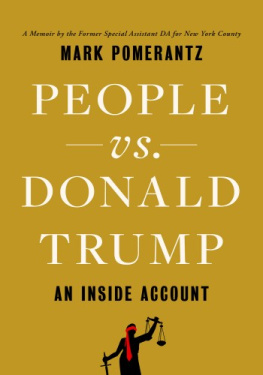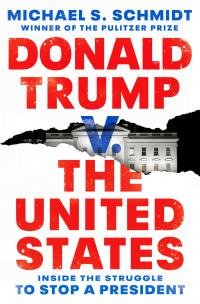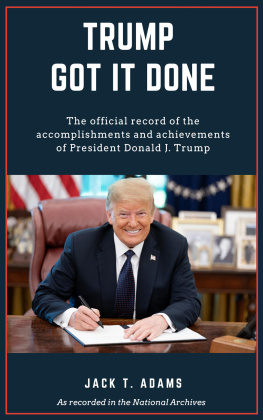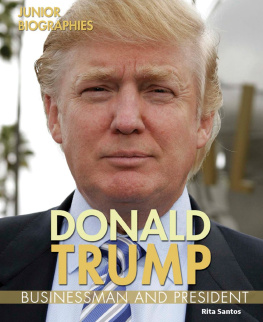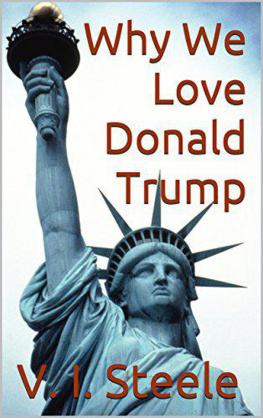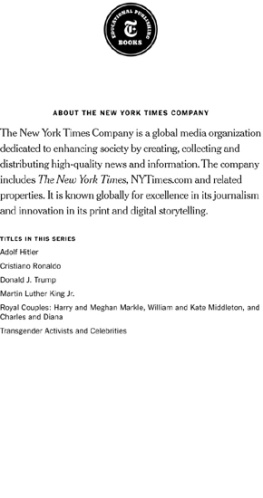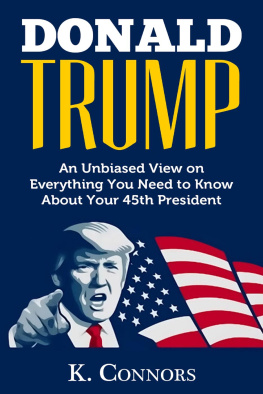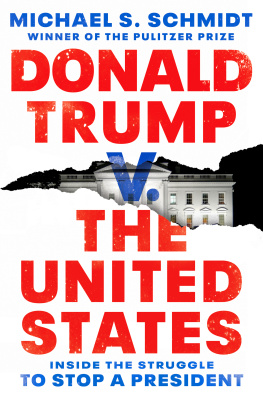Thank you for downloading this Simon & Schuster ebook. Get a FREE ebook when you join our mailing list. Plus, get updates on new releases, deals, recommended reads, and more from Simon & Schuster. Click below to sign up and see terms and conditions. CLICK HERE TO SIGN UP Already a subscriber? Provide your email again so we can register this ebook and send you more of what you like to read. You will continue to receive exclusive offers in your inbox. To Judy Thank you for fifty-four years of love, devotion, and patience
INTRODUCTION
I n February 2021, the media ran stories about a new lawyer who had joined the staff of the Manhattan district attorney to work on the investigation of Donald Trump. The press described the lawyer in favorable, almost breathless terms. He was new to the investigation but no fresh-faced rookie. The media labeled him a seasoned prosecutor and a veteran defense attorney. He had handled cases involving organized crime and complicated financial scandals. He knew the white-collar world. He was said to be the real deal, and a heavy hitter. The reporters and pundits predicted that he would get the job done.
That new lawyer was me. When I joined the Trump investigation, I got countless emails and telephone calls from friends and colleagues, urging me to go get him and wishing me luck. A year later I resigned from the district attorneys office and told the DA that he was responsible for a grave failure of justice because he would not authorize Trumps indictment. There was another media wave, and again I got emails and telephone calls from friends, and many from strangers, thanking me for my service but expressing sadness and disappointment that I had resigned. Some of the messages were not so friendly. One postcard informed me that I was the scum of the earth and said, no one gives a flying fuck about what I think. Mostly, though, people who contacted me wanted to know one thing: What happened? Why had the investigation, which by all accounts had been gaining steam and seemed likely to lead to criminal charges against the former president, come to a sudden stop?
This book explains what happened, at least as I saw it. Over the months that I and others worked on the case, we developed evidence convincing us that Donald Trump had committed serious crimes. As we put the facts together, many of us came to believe that we had enough evidence to convict him, and we could present a solid case in court that would lead to a guilty verdict. The district attorney agreed and authorized the prosecution. But then the district attorneys office went through one of its very infrequent regime changes. The new regime decided that Donald Trump should not be prosecuted, and the investigation faltered. What happened? Grab something to drink and find a comfortable chair. I will tell you all about it.
CHAPTER ONE OUTSIDE COUNSEL
I n December 2020 I was a quietly content older lawyer, living a retired life in a suburb of New York City. The coronavirus pandemic was raging. When people asked me what I was doing to fill my days, my standard answer was, Im doing nothing, and I dont start that until noon. I was planning how to celebrate my wifes seventieth birthday and pondering the looming New York winter, with its short days and somber skies. My calendar had few entries, and I was hunkered down in the split-level ranch house where we had lived for the last thirty-five years.
Some months earlier, I had come through two surgeries for an aggressive and life-threatening form of cancer. The surgeries were successful, but the diagnosis prompted me to have an intimate conversation with myself about life and death. I decided to appreciate more fully the rich and bountiful life I had lived. That life had included a large and close familymy wife and I had raised twin daughters and twin sons, and the four children had blessed us with four spouses and seven (now eight) grandchildren. I had had a long and successful legal career. After graduating from the University of Michigan Law School in 1975, I had been a law clerk for a distinguished federal judge, a law clerk at the Supreme Court of the United States, a law professor, a federal prosecutor, and a criminal defense attorney for many years. I had prosecuted and defended cases involving murder, drug trafficking, political corruption, tax evasion, and financial fraud in many of its infinite variations.
Before I retired, I was a senior partner at a prominent New York City law firm. There I spent many years juggling cases and clients. My work life had been frenetic, filled with phone calls, meetings, travel, court appearances, and big black document binders that I had to study for whatever case I was preparing. By December 2020, that frantic activity had long faded from my lifes rearview mirror. I missed the excitement and joy of working on significant cases with engaging colleagues, but I had no desire to head back into the maelstrom of practicing law.
Then the telephone rang. It was Carey Dunne, counsel to the office of Manhattan district attorney Cyrus (Cy) Vance, asking if I would consider joining a group of outside lawyers who would advise Cy Vance in connection with his pending investigation of Donald Trump.
Cy Vance had become Manhattans district attorney in 2010. As the district attorney for New York County (the formal name for Manhattan), he had the authority to bring criminal charges based on violations of New York State law that took place in Manhattan. He could not bring federal criminal chargesthat was the job of the United States attorney. However, since Donald Trump ran his business operations from headquarters in Manhattan, Cy Vance had jurisdiction to investigate Trump and the Trump Organization for all sorts of criminal conduct, including fraud, issuing false financial statements, falsifying business records, and any other behavior that was illegal under New Yorks Penal Law.
I did not know Cy well; I was already beginning to wind down my career as a criminal defense attorney when he became district attorney. But after I joined the investigation team, I got to know both Cy and Carey Dunne very well. Physically, they are cut from the same bolt of cloth. They are both lean and handsome men, of a similar age (midsixties), with distinguished shocks of gray hair. They had served together as assistant district attorneys in Manhattan during the 1980s. Both are unfailingly polite and well-spoken. They both have country homes in Connecticut, consistent with what I thought of (perhaps wrongly) as their patrician lifestyles. Cy was the son of Cyrus Vance Sr., a prominent lawyer who had served as secretary of state under President Jimmy Carter. He reminded me of my old boss, Potter Stewart, a justice of the United States Supreme Court for whom I had served as a law clerk in 197677. Cy, like Justice Stewart, was mild-mannered, almost deferential in his speech. Stewart had been a Yale law student along with Cys father. Cy seemed to have inherited the persona of a thoughtful and considerate gentleman who believed in public service and who exuded a certain noblesse oblige. There is another, less visible aspect to Cys personality: his weekend hobby is riding his motorcycle on Connecticuts back roads.
Carey, like Cy, is whip-smart, but more intense. He is always poised and in control of himself, not shy but never overbearing. He is smooth; some might even describe him as debonaire, though for years he has played the drums in an all-lawyer rock band. Consistent with his former position as general counsel in the district attorneys office, he is a lawyers lawyer. We were not friends in December 2020, but our paths had crossed several times over the years. We had represented different parties in several high-profile criminal cases. Carey represented ImClone Systems in a widely publicized insider trading case that led to prison terms for my client, ImClone CEO Sam Waksal, and television personality Martha Stewart. Carey also represented Credit Suisse in an investigation in which I represented investment banker Frank Quattrone. Quattrone, after being charged with obstruction of justice, ultimately was exonerated and the criminal and regulatory charges against him were all dismissed. Our clients in those cases had different interests, and we were not close, but I knew Carey from those and other matters. I also knew that Carey had a formidable record of accomplishment as a past president of the New York City Bar Association and a longtime partner at Davis Polk & Wardwell, one of the countrys leading law firms. Carey had retired from Davis Polk in 2017 to rejoin the district attorneys office as its general counsel.
Next page
